- Home
- Lou Cameron
Piccadilly Doubles 2 Page 5
Piccadilly Doubles 2 Read online
Page 5
There could be no doubt that his drinking had not gone unnoticed at his newspaper. Even if he drank only at night, the signs of that drinking must be obvious to everyone in his office. A man may bathe and drink any amount of black coffee before he shows his face on the morning after, yet there is little he can do to hide the trembling hands, the greasy sweat of a hangover. By itself, the drinking meant very little, for as I have learned, many Mormons are far from abstemious. On the other hand, Davenport gave the appearance of a man on the verge of mental collapse; he looked like a man pursued by private demons. I hoped that some of this might be attributed to the disappearance of his wife.
What in blazes was I going to do? Not many hours remained till morning, and I had to arrive at some decision that would not condemn Davenport to death and at the same time would make it possible for me to maintain my uneasy “friendship” with Rockwell. I owed nothing to Davenport, yet common humanity compelled me to consider his plight. Many newspapermen would scoff at me; nonetheless, I was not about to betray him.
~*~
I ended my journal entry there and for a time sat staring at my notebook. “Damn you, Davenport,” I complained to the four walls of my room.
The envelope lay untouched on my bed; to me it had all the menace of a rattlesnake with its tail abuzz. I opened it and took out a sheaf of paper of the kind used in newspaper offices. The handwriting was spidery but legible. The statement or dying declaration, as Davenport called it in his melodramatic way, was dated December 15, 1859, and the place it was recorded was given as Provo, a town south of Salt Lake with which I was not familiar at the time. Printed in capital letters were the words: THE MOUNTAIN MEADOWS MASSACRE. BLOODY CRIMES OF ORRIN PORTER ROCKWELL AND JOHN DOYLE LEE AND OTHER MEMBERS OF THE ACCURSED DANITE BAND. SLAUGHTER OF THE INNOCENTS.
Even in the largely indifferent East the Mountain Meadows Massacre had done much to inflame public opinion with regard to the Mormons, and though the Saints vigorously denied any involvement in the terrible affair, deep suspicion remained. The Mormons blamed the slaughter on the Paiute Indians; the only certainty was that one hundred and twenty men, women, and children had been murdered. Most were farm people from Arkansas, all were bound for California when disaster struck their wagon train. And now, according to Davenport, I was about to discover the truth.
The statement read as follows: “I, Joshua Lambert, being of sound mind but with a conscience much troubled by certain events of my past life, so hereby swear by Almighty God that the following is true in every detail. I have no living relatives; therefore, I can now unburden myself of the terrible sins which have weighed down my spirit for so long, without bringing shame to those I loved and from whom I strayed so far. I was born in Burlington, Vermont, in the year 1820; in my thirtieth year I was converted to the Mormon faith and thereafter made my way to the Great Salt Basin where I continued to follow my trade as wheelwright.
“In those early days I was convinced of the sincerity of the Mormon faith, little knowing where my gullibility would take me. As an able-bodied man, I became a member of the Nauvoo Legion, the Mormon militia, and as such I took part in several campaigns against the Indians, as a consequence of which I won the praise of Porter Rockwell, one of our principal leaders, a man of great persuasiveness. In the months that followed, Rockwell sought me out on several occasions and asked many questions, all having to do with my loyalty to the Mormon church. Satisfied that I was a true believer, Rockwell invited me to join the Danite Band, also known as The Avenging Angels, a secret police force answerable only to Brigham Young.
“Much has been said and written about the Danite Band; suffice it to say that it is an organization composed of murderers and thieves. Let any man, Mormon or Gentile, utter a word against Brigham Young and his cohorts and he will find himself marked for death by the Danites, whose leaders are Porter Rockwell and William A. Hickman, scoundrels of the deepest dye. At the time I was initiated into this criminal society it was impressed upon me by Rockwell that I was a member for life; the secrets of the Danite Band were to go with me to my grave. There was only one punishment for dereliction of duty, namely death. I might run to the ends of the earth, Rockwell stated, but in time they would find me. I took the oath and became a murderer among murderers, repeating with the others the following words: ‘When it is necessary that blood should be shed, we should be as ready to do that as to eat an apple’. These words, which originated with the Mormon elder Heber C. Kimball, had been adopted by the Danites as their slogan.
“There were three other recruits present and Rockwell spoke of the danger the Mormons faced from internal as well as external enemies; we must forget the word mercy. Orders were to be obeyed without question, without a moment’s hesitation, or the whole purpose of the Danite Band was lost. The Mormon church must come first in all things, Rockwell said, and if a member of our families proved to be disloyal, that person must be ‘used up’—exterminated. Since I was far from home, and unmarried, this meant nothing to me.
“Having been sworn in, I expected to be given some dangerous task, but many months passed before I was told to report to Rockwell and to bring my rifle and sidearms as well as provisions for several weeks. Many of the Danites were at Rockwell’s ranch in Skull Valley when I arrived there. The day was October 1, 1855. I was sure that many of the Danites had been criminals before they became Mormons, for in the clear light of day they presented a most dastardly appearance. Rockwell, assuming an attitude of great truculence, made no bones about our purpose, which was the wiping out of a wagon train made up of Gentiles commanded by Captain Charles Fancher and guided by a man named Elijah Perkins. It was a ‘rich train’ in Rockwell’s words, one of the richest ever to pass over the Spanish Trail, its members having sold good farmland in Arkansas. It was rich in gold and livestock, Rockwell said, adding that the emigrants had not paid for the passports’ required for passage across Mormon territory, which had just recently been placed under martial law by Brigham Young.
“None of us questioned Young’s authority to commit such an illegal act, Utah being as much a United States territory as any other territory governed by Washington. There is no doubt in my mind that the Fancher train was doomed as soon as it passed through Salt Lake City; the so-called passports had nothing to do with it. The emigrants were to be murdered for their money and possessions. As Rockwell explained it to us, the Paiute Indians were going to do the dirty work, for which they would be paid with the things the Mormons didn’t want. The Danites had been called out to see that the dirty work was done, or to reinforce the savages if they failed to destroy the well-armed train.
“At this point, I must explain that many of the Paiutes had been converted to the Mormon faith, the principal reason being that the Mormons had promised them that some day Saints and Indians would unite in an all-out war against the ‘Americans.’
“As we rode out from Rockwell’s ranch, the man in charge of the expedition was ‘Bishop’ John Doyle Lee, adopted son of Brigham Young. However, Lee was commander in name only: the real leader of this murderous party was Porter Rockwell. W.A. Hickman was his lieutenant.
“The Fancher train lay in camp in the fertile Mountain Meadows, grazing its cattle before braving the waterless journey across the deserts of Nevada and southern California. While we watched from afar, the Paiutes attacked as ordered, but the sharpshooters of the train, entrenched behind wagons hastily drawn into a defensive formation, soon dampened the original enthusiasm. Faced with heavy rifle fire, the Indians retreated; some of their leaders left the field and the remaining braves were persuaded with difficulty to maintain even a desultory siege.
“With a brow as black as thunder, Rockwell called a meeting of his lieutenants and said it was up to the Danites to finish the job the savages had botched, but since these defenders of the faith had little stomach for facing the rifles of the entrenched Arkansas farmers, a policy of treachery was outlined whereby the emigrants could be murdered without danger to the Saints.
“At the command ‘Do your duty to God’ shouted by Porter Rockwell, the Danites, myself included, shot down the men and women under their protection. We rode our horses through their ranks, firing right and left, and when some of the men hesitated to shoot the children, Rockwell shouted ‘Nits breed lice’ and blew out the brains of two little girls huddled together and screaming in terror. The slaughter continued until the once peaceful meadows were wreathed in the powder from our guns and one hundred and twenty men, women, and children lay dead or dying in the grass. Rockwell then raised his hand and summoned the cowardly Paiutes, who had been watching for his signal, and once they received it they rode in to finish off the wounded, and with the ferocity of cowards they vented their rage on the dead, scalping and mutilating the bodies of the men, committing vile acts of outrage upon the corpses of the women and female children. For this ghastly work they were paid in blood-stained clothing, mirrors, boots, canned goods, a few horses, and a few cows. All else became the property of the Church of Jesus Christ of the Latter-Day Saints.
“The slaughter concluded, Rockwell once again pledged us to absolute secrecy with the bloodcurdling oaths of the Danites. We were pledged, too, to spread the story that the massacre was the work of the Indians. Other stories were to be circulated; stories of excesses perpetrated by the emigrants while journeying through the Mormon settlements—the Gentile travelers cursed and swore, they poisoned springs, members of the train boasted that they had been members of the mob that slew Joseph Smith.
“All this was planned by Porter Rockwell, as the massacre itself was planned by him. As for myself, I took no part in subsequent Danite raids, having been stricken with consumption several months later, and since then, sick and unable to work, I have eked out a living in any way possible. Now heartsick and about to die, I feel it is my duty to speak out, however late it may be; to tell the truth of what happened at Mountain Meadows; above all, to place the blame where it belongs—on the head of Orrin Porter Rockwell. Fifty-odd men, all Danites, took part in the massacre; their names are listed as I remember them.”
The statement was signed by Joshua Lambert and witnessed by Robert Davenport.
Hardly knowing what to do, I folded the statement and put it back in the envelope. Everything in it might be true, but it was obvious that the words were not the dead man’s: Davenport, the prig, had dressed it up in an effort to make it seem more important, which was stupid of him, for the wheelwright’s no doubt rude talk would have sounded closer to the truth. If true, it was a terrible indictment of Rockwell and his fellows. It put the Turks to shame, for after all the Turks were simply Turks and hardly knew any better, whereas Rockwell and his men were native Americans, although there may have been a few Europeans in their number. They were white, whatever else they were; they claimed to be civilized.
I managed to sleep for a few hours, but when I awoke an hour before dawn I was no closer to a solution than I had been the previous night. If the decision were up to Horace Greeley, he would have betrayed Davenport with infinite regret. Anything to sell more newspapers, I suppose; and if he bothered to justify that betrayal, he would have said, reasonably enough, that it was only a matter of time before Davenport betrayed himself. This was perfectly true but it was no consolation.
As it turned out, Robert Davenport solved the problem for me.
Chapter Five
He solved my problem by dying sometime during the hours after he left me and before they found him hanging from a tree limb at seven o’clock in the morning. I must have been having breakfast when they cut him down, but I didn’t hear about it till several hours later. The news came from Rockwell.
I was in my room, looking through my notes of the previous day, when he knocked and came in. Before I had a chance to speak, Rockwell said, “I’m in town because a man named Davenport hung himself to a tree.”
I thought he said it rather quickly, as if he knew about Davenport’s visit and wanted me to tell him the truth.
“Robert Davenport?” I asked. “A newspaperman?” A strange feeling passed over me as I said the words.
Rockwell’s face showed nothing, not even mild surprise. “You know him, William?”
It could be a trick but I didn’t think so. “A man calling himself Robert Davenport was here last night. I went to take a bath and found him in my room. He was fairly drunk. Did you know he was here?”
Rockwell shook his head. “I heard about it just now.”
I took the envelope from my pocket. “Then you can’t have known that he gave me this.”
I held out the envelope and Rockwell said quietly “You’re forgetting I can’t read. It’s about me, is it? Of course you’ve read what’s in it? I’d like to know top.”
“You won’t like what you hear.”
“If it’s about Mountain Meadows, I’ve heard it before. Heard of it. Read it, William.”
I read it down to the last name in Joshua Lambert’s roster of child killers. All through the dismal recital Rockwell remained motionless, his face a blank. Then he said what I had been thinking earlier. “He sure is a fancy talker for a wheelwright.”
“ Davenport prettied it up.”
“And maybe he made it up.”
“Was there such a man as Joshua Lambert?”
“There was, William. I knew him well enough before he got sick and moved down to Provo. You believe what you just read to me?”
“I believe there was a massacre,” I answered.
Rockwell’s voice remained calm. “That’s not what I asked you. Do you believe I was a part of it?”
“You tell me, Port. No, I take that back. You don’t look like a man who would blow out the brains of two little girls. Not even for the church.”
I said that to see how Rockwell took it. “I would if it meant the survival of my church. You want the truth. Well, there’s a bit of truth for you. But I didn’t plan Mountain Meadows and I wasn’t there.”
That was as good as admitting the guilt of the Mormons, but I chose not to follow up with questions. He was willing to kill children in defense of his church, something that was outside my understanding of men and motives. Besides, I was unable to imagine a situation where it would be necessary to murder children for any reason. It was quite possible that he was lying; to the fanatic lying is just another way of outwitting the enemy A few lies or many murders—the religious fanatic has no sense of proportion.
Rockwell made no move to take the statement from me. “Let me ask you something,” he said. “If I hadn’t told you Davenport was dead, would you have told me about this?”
“I don’t know,” I said. “I wanted to. I didn’t want to get the man killed.” Suddenly it occurred to me that Davenport might not have taken his own life. I should have thought of it immediately. A man who was willing to kill children for a cause would not hesitate to strangle a man and to hang him from a tree. In my mind I saw Davenport straggling home, the men waiting for him in the dark, the brief struggle. Rockwell’s hands were large and muscular, the fingernails flat and thick, almost like bone. With hands like that, it would be so easy.
“What did you say to Davenport?” Rockwell asked.
&n
bsp; “I told him to go far from here, to keep his mouth shut. I hoped he’d take my advice. I didn’t seek him out, Port.”
“But now you’re thinking about what he said?”
“I have to think about it. How can I not?”
“You’re thinking maybe I killed him?”
“Did you kill him?”
“If I wanted to kill him I’d shoot him,” Rockwell said. “That doesn’t mean I haven’t thought about it. I knew what he’d been saying about me and the church, but I let him go on because he might have led me to government spies. Nobody forced Davenport to join our church, but once he did he was bound by the same rules as the rest of us. And no matter what they tell you, no man is held in the church against his will. Davenport could have left but he didn’t. He stayed in the church so he could destroy it.”
“That’s what he wanted to do.”

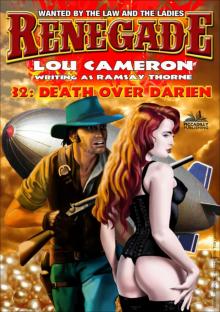 Renegade 32
Renegade 32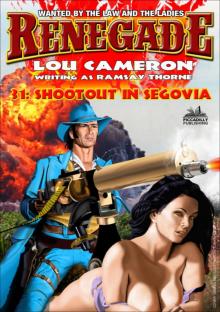 Renegade 31
Renegade 31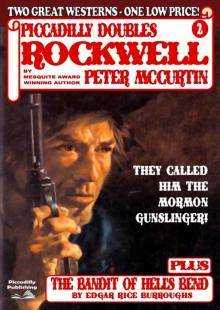 Piccadilly Doubles 2
Piccadilly Doubles 2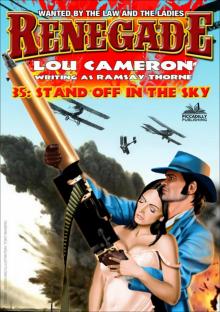 Renegade 35
Renegade 35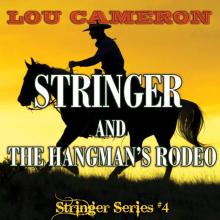 Stringer and the Hangman's Rodeo
Stringer and the Hangman's Rodeo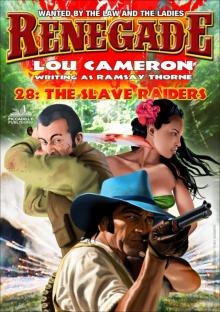 Renegade 28
Renegade 28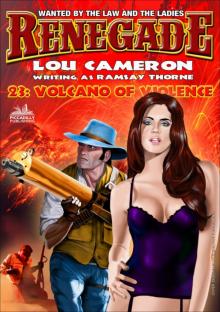 Renegade 23
Renegade 23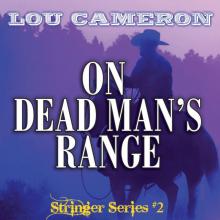 On Dead Man's Range
On Dead Man's Range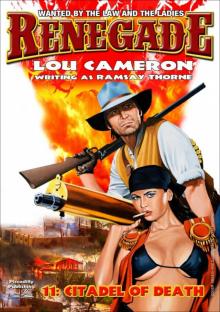 Citadel of Death (A Captain Gringo Western Book 11)
Citadel of Death (A Captain Gringo Western Book 11)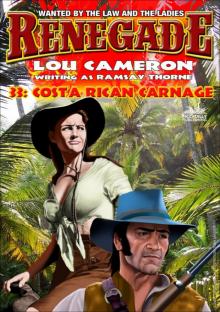 Renegade 33
Renegade 33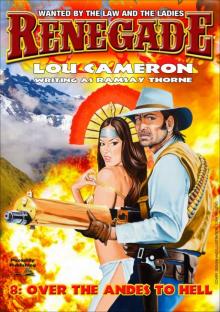 Over the Andes to Hell (A Captain Gringo Western Book 8)
Over the Andes to Hell (A Captain Gringo Western Book 8)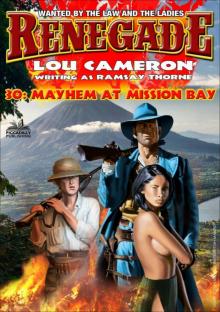 Renegade 30
Renegade 30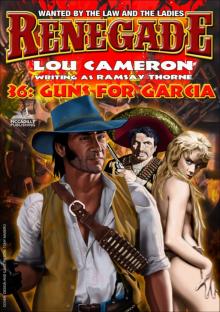 Renegade 36
Renegade 36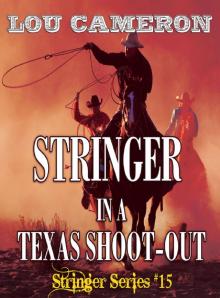 Stringer in a Texas Shoot-Out
Stringer in a Texas Shoot-Out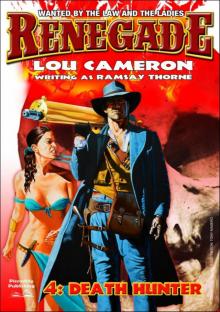 The Death Hunter
The Death Hunter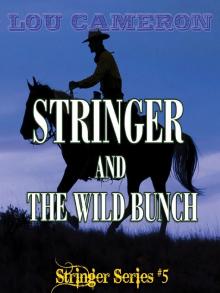 Stringer and the Wild Bunch
Stringer and the Wild Bunch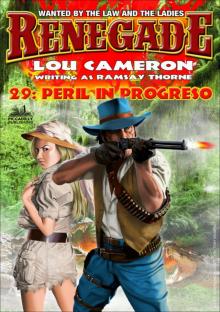 Renegade 29
Renegade 29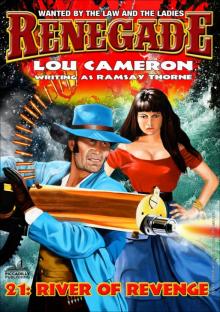 Renegade 21
Renegade 21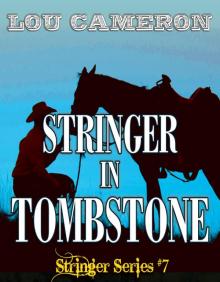 Stringer in Tombstone
Stringer in Tombstone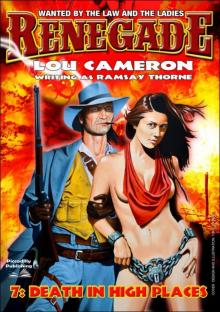 Death in High Places (A Renegade Western Book 7)
Death in High Places (A Renegade Western Book 7)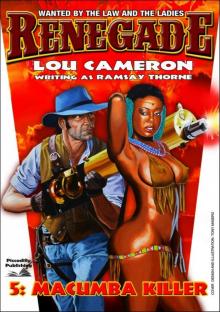 Macumba Killer
Macumba Killer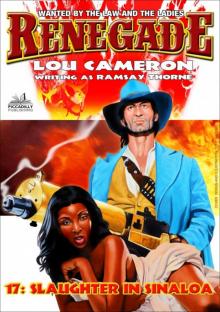 Renegade 17
Renegade 17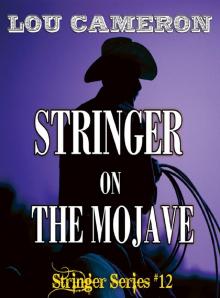 Stringer on the Mojave
Stringer on the Mojave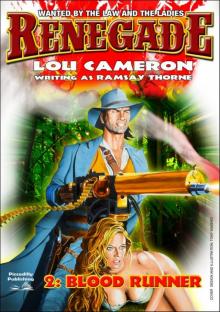 Blood Runner
Blood Runner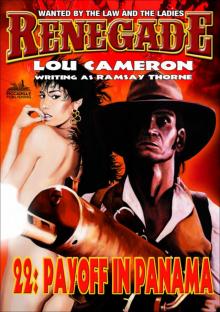 Renegade 22
Renegade 22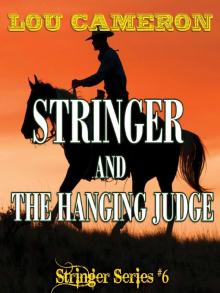 Stringer and the Hanging Judge
Stringer and the Hanging Judge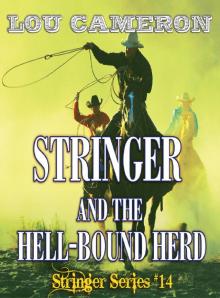 Stringer and the Hell-Bound Herd
Stringer and the Hell-Bound Herd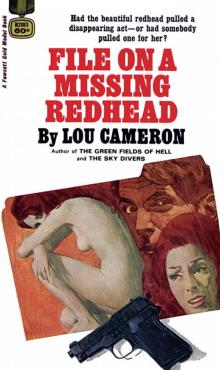 File on a Missing Redhead
File on a Missing Redhead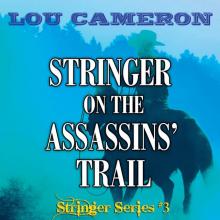 Stringer on the Assassins' Trail
Stringer on the Assassins' Trail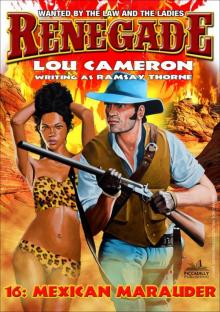 Mexican Marauder (A Captain Gringo Adventure #16)
Mexican Marauder (A Captain Gringo Adventure #16)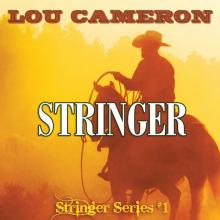 Stringer
Stringer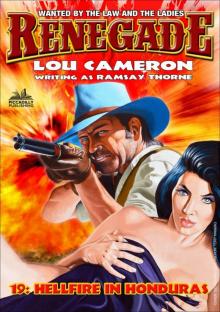 Renegade 19
Renegade 19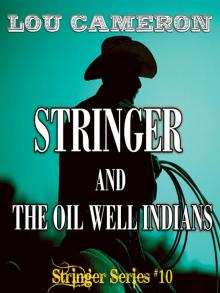 Stringer and the Oil Well Indians
Stringer and the Oil Well Indians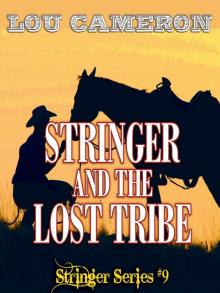 Stringer and the Lost Tribe
Stringer and the Lost Tribe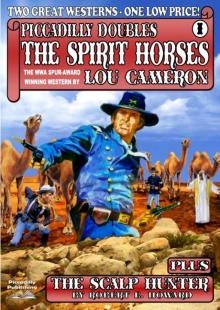 Piccadilly Doubles 1
Piccadilly Doubles 1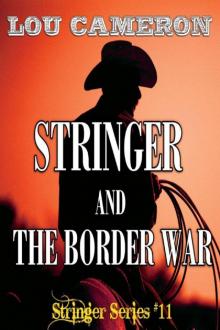 Stringer and the Border War
Stringer and the Border War Renegade
Renegade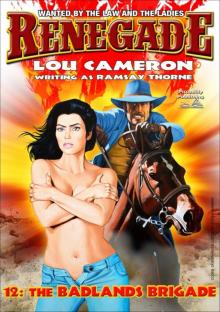 The Badlands Brigade (A Captain Gringo Adventure Book 12)
The Badlands Brigade (A Captain Gringo Adventure Book 12)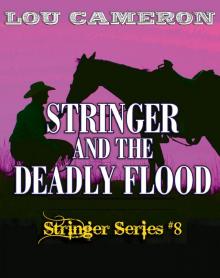 Stringer and the Deadly Flood
Stringer and the Deadly Flood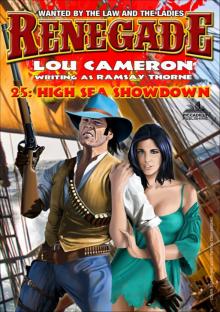 Renegade 25
Renegade 25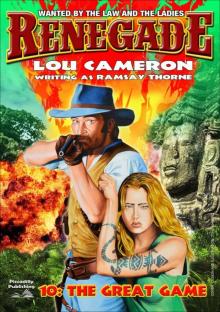 The Great Game (A Captain Gringo Western Book 10)
The Great Game (A Captain Gringo Western Book 10)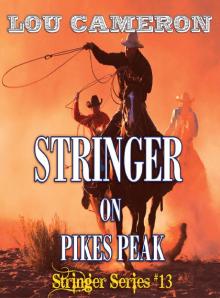 Stringer on Pikes Peak
Stringer on Pikes Peak